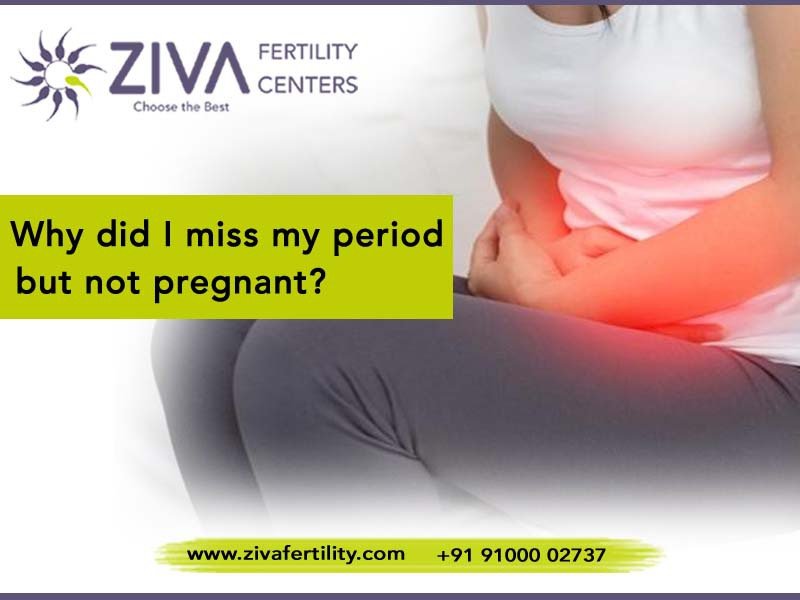In a couple’s life, deciding to have a baby can bring both joy and concern. It is a common observation that in the initial stages of getting pregnant, women notice every minute in detail and start researching it. One of the main indications of pregnancy is missed periods, so it is natural for a couple to hope that a baby is on the way. But a missed period might not confirm a pregnancy, but that is not at all a cause for concern. There are various factors for missed or late periods, and we hope this blog will raise awareness about missed/irregular periods and their causes.
What is a healthy menstrual cycle?
Every 28 days, the ovaries release an egg in a process called ovulation. If there is no fertilization, the periods will usually start about 14 days later. In the normal course of life, a healthy menstrual cycle occurs every 21 to 35 days. There are two instances when it is normal to experience irregular periods, i.e. when they first begin and when menopause starts. While a missed period is one of the early signs of pregnancy, there are various other reasons for missing periods. Amenorrhoea is a condition where a woman does not menstruate for three months in a row, and it affects around 3–4 percent of women.


Reasons for Missed/Irregular periods
When the ovaries stop making enough of the female hormone estrogen, it results in Amenorrhoea. One of the following reasons could be a possible cause for lack of estrogen:-
Weight changes
Rapidly changing body weight (increase or decrease) causes hormonal imbalances. Being either underweight or overweight/obese causes menstrual problems. The problem can be corrected over some time if the woman adapts to a healthy weight management lifestyle. If a woman has low body weight or very little body fat,
excessive exercise can cause missed periods.
Stress
Of the many adverse effects of long-term stress, a crucial one is that it affects the hypothalamus in the brain, which controls the reproductive hormones. The imbalance in these reproductive hormones stops ovulation and periods. However, women can overcome this problem by learning how to manage stress. Women can practise meditation, relaxation techniques, yoga, or practise their favourite hobby etc., to manage stress, and periods will slowly come back to normal.
Producing too much prolactin
Excessive production of the hormone Prolactin can halt menstruation. This is a hormone produced in breastfeeding mothers, so most breastfeeding women do not have periods. However, if you are not pregnant and neither are breastfeeding, but if there is a milky discharge from the breasts, it signifies that the body is making an abnormally high amount of prolactin. This problem can be corrected with medication.
Thyroid problems
The Thyroid gland produces hormones that control the metabolism of the body. An imbalance in the production of these hormones leads to two specific conditions:-
- Hypothyroidism, or an underactive thyroid, in which the thyroid produces less than normal levels of these hormones.
- Hyperthyroidism, or an overactive thyroid, in which the thyroid produces higher than normal levels of these hormones.
Either of the imbalances is not good and affects the frequency of periods. If you observe any of the below signs, then it indicates Hyper/Hypothyroidism:-
- Fatigue or extreme tiredness over a prolonged period
- Hair loss
- Unexplained weight gain or loss
- Feeling cold or being warm all the time
A simple blood test can reveal thyroid problems which can be corrected with medication.
Polycystic ovary syndrome (PCOS)
PCOS is a condition where women produce more male hormones called androgens. Excess production of male hormones tampers the menstrual process, along with cyst formation on the ovaries. This can make ovulation irregular or stop it altogether and affect fertility in women. Symptoms to watch out for to identify PCOS are:-


- Irregular periods or no periods
- Very less and very heavy bleeding during periods
- Acne, dark patches, or skin tags
- Weight gain
- Thinning hair
- Sleep apnea
- Difficulty getting pregnant
- Hair growth on the face, back, or thighs
Eating disorders
The most common eating disorders are anorexia nervosa or bulimia, which will stop the periods over time. If the bodyweight is 10 per cent less than the normal range for your height, it changes how your body functions and stops ovulation. Getting treatment for eating disorders and gaining a healthy weight will self correct the period’s problem.
Perimenopause
If a woman does not have her period cycle for 12 months, it is menopause. However, the transition is not sudden. There is a phase before that called perimenopause. Perimenopause might occur 4-5 years earlier than the actual menopause. The symptoms of perimenopause include:
- Irregular periods
- Heavier or lighter periods
- Hot flashes
- Problems sleeping
- Mood swings or irritability
- Vaginal dryness
- Less interest in sex
As you have read through all the causes of missing and irregular periods despite not being pregnant, it is evident that many of these causes can be corrected if women are more disciplined with their bodies. It is essential to educate girls from a young age about female health to become aware that the choices they make in terms of food, exercise and stress management have long-term consequences. To understand more details or have a personal consultation, reach us at ZIVA Fertility Centers at +91-9100002737, +91-9392834024 or email us at Info@zivafertility.com.
















